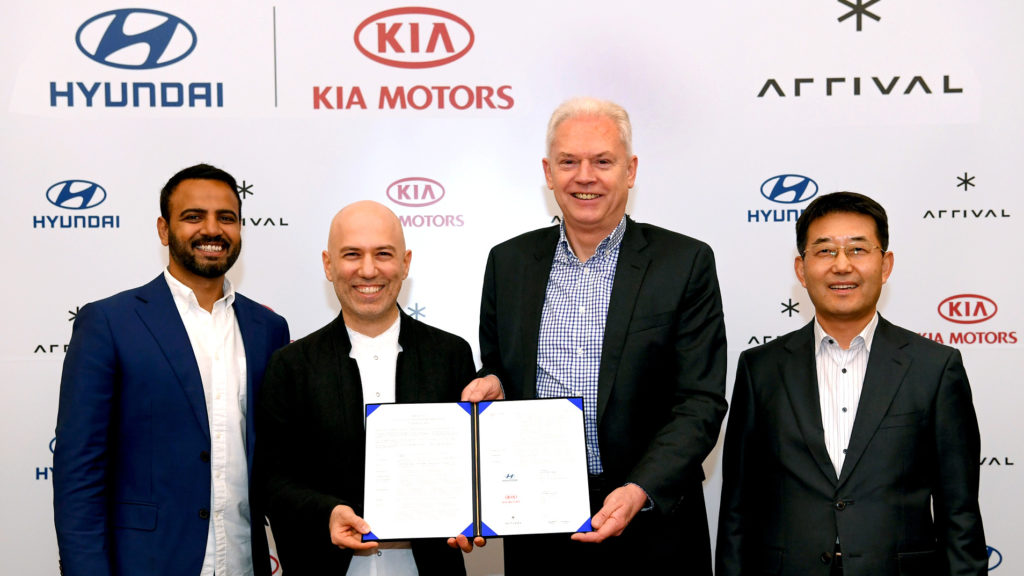Last updated on April 8th, 2020 at 07:58 pm
Hyundai Motor Company and Kia Motors Corporation have recently announced a strategic investment of €100 million in a new partnership with Arrival, a UK-based EV startup. The two companies plan to introduce a competitively priced small and medium-sized electric vehicles; this includes vans, logistics vehicles and on-demand ride-hailing and shuttle services.
The British-born company, Arrival is said to have a ‘scalable electric platform', which can be tailored to a multitude of different chassis. As such, the South Korean manufacturers will look to develop a range of Purpose Built Vehicles (PBV).
Albert Biermann, President and Head of Research and Development Division for Hyundai Motor Group, and Denis Sverdlovsk, Chief Executive Officer of Arrival, signed the contract on 16 January; the agreement is that Hyundai will contribute €80 million, while Kia will put forward €20 million.
Read next: Hyundai unveils its strategy for 2025
“The eco-friendly vehicle market in Europe is expected to grow rapidly due to the introduction of further environmental regulations,” said Biermann. “Through the joint development of electric commercial vehicles with Arrival, we will be able to gain a competitive advantage and progressively establish our leadership in the global eco-friendly vehicle market, with Europe at the forefront.”
Arrival’s CEO Sverdlovsk added: “Arrival has created a game changing product category – Generation 2.0 electric vehicles. Hyundai and Kia have been making amazing vehicles with uncompromising quality and share our vision for an electric mobility future. Our Strategic Partnership with Hyundai and Kia means we will scale Generation 2 electric vehicles globally and importantly – in the very near future.”
Founded in 2015, Arrival has production plants R&D centres all over the world; namely in the UK, US, Germany, Singapore and Russia. Its vehicle platform is modular, which means it can be chopped and changed upon request; the base incorporates a battery pack, electric motor and driveline components. Aiming at the LCV and logistics market, Hyundai and Kia plan to use Arrival's services in order to expand their European presence.
At the heart of the partnership also lies PBVs, where Hyundai and Kia are looking at exploring smart mobility solutions for shared-service companies and logistics companies.
Read next: Kia ramps up its supply of electric vehicles
The South Korean companies have noted a rapid growth in online shopping, whereby delivery vans and trucks are soaring in demand. Given the pressure imposed by the European parliament on emissions, companies such as Hyundai and Kia are looking to provide eco-friendly vehicles. In fact, in 2021, the EU is set to impose ‘the world’s most stringent vehicle emissions regulations', where each automaker's fleet-wide average CO2 emissions will be limited by 27%, from 130 g/km to 95 g/km.
Youngcho Chi, President and Chief Innovation Officer at Hyundai Motor Group said: “This investment is part of an open innovation strategy pursued by Hyundai and Kia. We will accelerate investment and cooperation with companies with advanced technology such as Arrival, to respond to the rapidly changing eco-friendly vehicle market.”
“We are excited to come out of stealth mode with our partnership with Hyundai and Kia, a globally respected OEM with brilliant products on the road, and our complementary expertise will allow us to rapidly transition to full scale global production. Accelerating electric vehicle adoption is good for everyone – for people, business and the planet and we are pleased to undertake this mission with our partners Hyundai and Kia”, added Avinash Rugoobur, Chief Strategy Officer of Arrival.
Read next: What is an EV? Everything you need to know about an electric car
It would seem Hyundai is going all-in to deliver battery and hydrogen fuel cell vehicles for the European market. To help facilitate this push, namely in the latter technology, the company recently set up Hyundai Hydrogen Mobility (HHM). This is a joint venture between Hyundai and Swiss hydrogen energy company H2 Energy. The two are planning on exporting over 1,600 hydrogen fuel cell trucks to Europe by 2025.
It's great to see all these companies striving towards a greener, more efficient future. Their capital investment won't go unnoticed and will be seen as a welcome sign for all those concerned about global warming.
